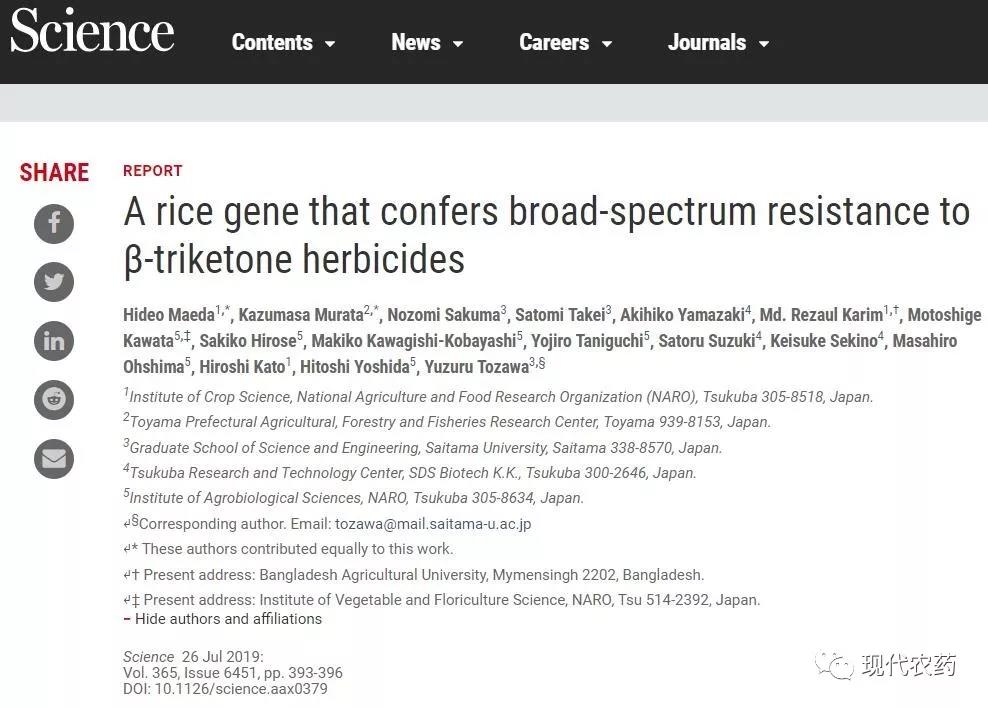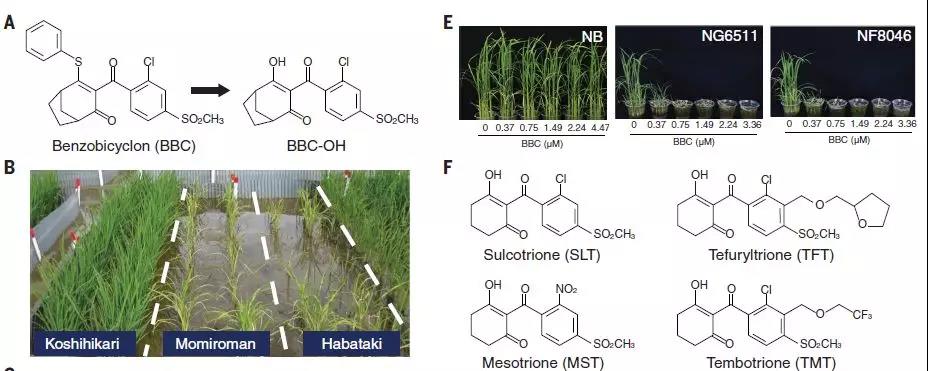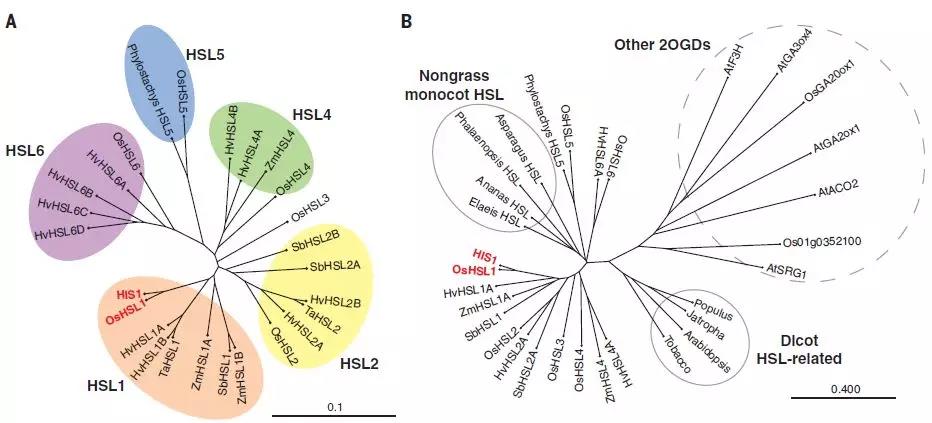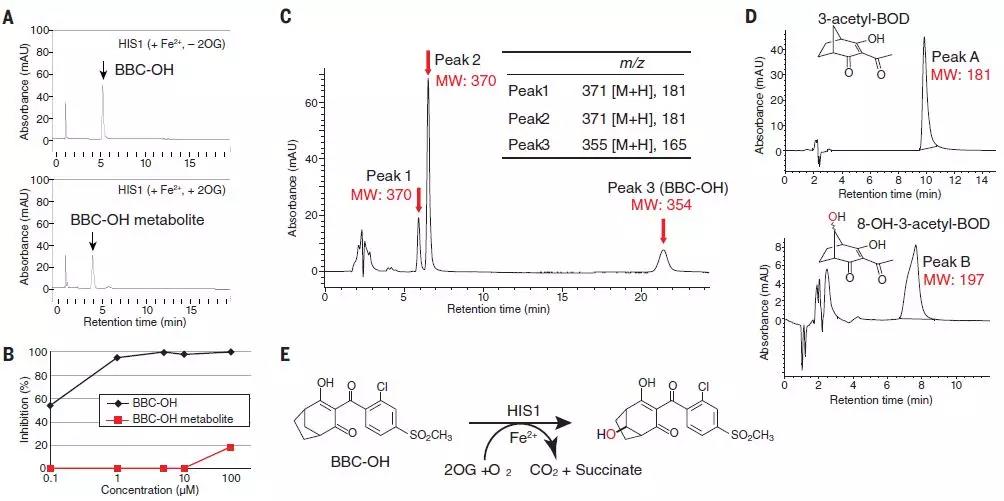 Rice (Oryza sativa L.) is a staple food for more than 3.5 billion people. Characterizing the genetic variation revealed by the genome of the Oryza genus, including domesticated and wild species, has allowed the identification of genes that can be used for crop breeding. Large-scale agricultural production depends on the weed control of herbicides, but long-term use of these agents can lead to the emergence of resistant weeds. Therefore, crop breeding requires a new combination of herbicide and herbicide resistance genes.
Rice (Oryza sativa L.) is a staple food for more than 3.5 billion people. Characterizing the genetic variation revealed by the genome of the Oryza genus, including domesticated and wild species, has allowed the identification of genes that can be used for crop breeding. Large-scale agricultural production depends on the weed control of herbicides, but long-term use of these agents can lead to the emergence of resistant weeds. Therefore, crop breeding requires a new combination of herbicide and herbicide resistance genes. Identification of BBC Resistance Genes in Indica Rice β-trione herbicides (bTHs) are 4-hydroxyphenylpyruvate dioxygenase (HPPD) inhibitors and are widely used in agriculture. bTH benzobicyclic (BBC), used for weed control in rice fields, has significant efficacy against rice weeds that can combat other types of herbicides, including sulfonylureas. However, some high-yielding rice cultivars are sensitive to BBC and fail to identify genes that cause BBC sensitivity, putting future rice breeding programs at risk, so the study set out to identify rice genes that confer resistance or sensitivity to BBCs.
Identification of BBC Resistance Genes in Indica Rice β-trione herbicides (bTHs) are 4-hydroxyphenylpyruvate dioxygenase (HPPD) inhibitors and are widely used in agriculture. bTH benzobicyclic (BBC), used for weed control in rice fields, has significant efficacy against rice weeds that can combat other types of herbicides, including sulfonylureas. However, some high-yielding rice cultivars are sensitive to BBC and fail to identify genes that cause BBC sensitivity, putting future rice breeding programs at risk, so the study set out to identify rice genes that confer resistance or sensitivity to BBCs. Phylogenetic analysis of HIS1 and its related proteins Here, the researchers identified a rice gene HIS1 (HPPD inhibitor sensitive 1) that confers resistance to BBC and other β-trione herbicides in rice. HIS1 encodes Fe(II)/2-oxoglutarate-dependent oxygenase, which detoxifies β-trione herbicides by catalyzing their hydroxylation. Gene transformation in Arabidopsis and rice HIS1 mutants confirmed this function of the HIS1 protein. Given that HIS1 can detoxify multiple bTHs as a single gene, its use in molecular crop breeding will support the diversity of herbicide selection.
Phylogenetic analysis of HIS1 and its related proteins Here, the researchers identified a rice gene HIS1 (HPPD inhibitor sensitive 1) that confers resistance to BBC and other β-trione herbicides in rice. HIS1 encodes Fe(II)/2-oxoglutarate-dependent oxygenase, which detoxifies β-trione herbicides by catalyzing their hydroxylation. Gene transformation in Arabidopsis and rice HIS1 mutants confirmed this function of the HIS1 protein. Given that HIS1 can detoxify multiple bTHs as a single gene, its use in molecular crop breeding will support the diversity of herbicide selection. Enzyme reaction catalyzed by HIS1 In addition, the study identified a second herbicide resistance gene OsHSL1 in rice and showed that forced OsHSL1 expression confers resistance to TFT in Arabidopsis. In view of the fact that the spread of weeds against HPPD inhibitors is still limited compared to weeds against other herbicides such as 5-enolpyruvylshikimate-3-phosphate synthase inhibitors and acetolactate synthase inhibitors, bTH is applied to farmland weed control together with HIS1 or OsHSL1.
Enzyme reaction catalyzed by HIS1 In addition, the study identified a second herbicide resistance gene OsHSL1 in rice and showed that forced OsHSL1 expression confers resistance to TFT in Arabidopsis. In view of the fact that the spread of weeds against HPPD inhibitors is still limited compared to weeds against other herbicides such as 5-enolpyruvylshikimate-3-phosphate synthase inhibitors and acetolactate synthase inhibitors, bTH is applied to farmland weed control together with HIS1 or OsHSL1. Contact: Mr. Ma
Phone: +86-0374-5699688
Tel: +86-0374-5699688
Email: [email protected]
Add: Fine Chemical Industry Park, Jianan District, Xuchang, Henan, China